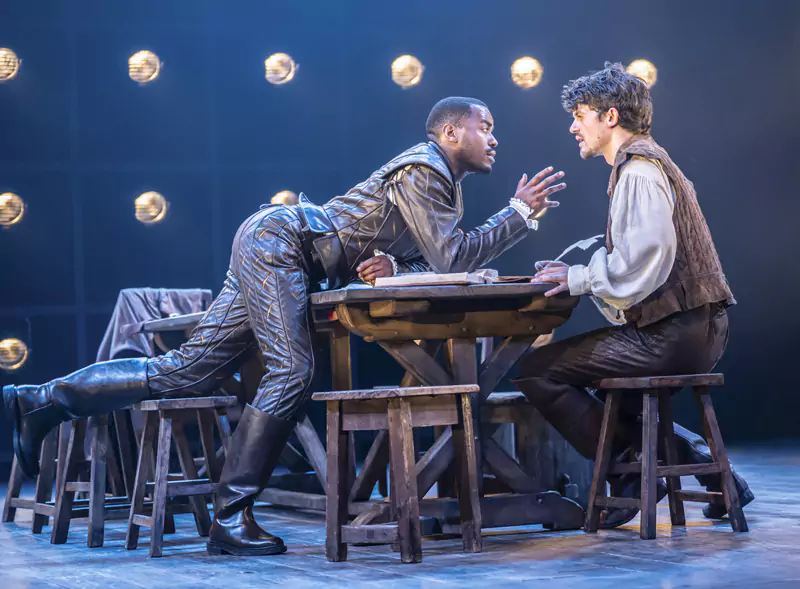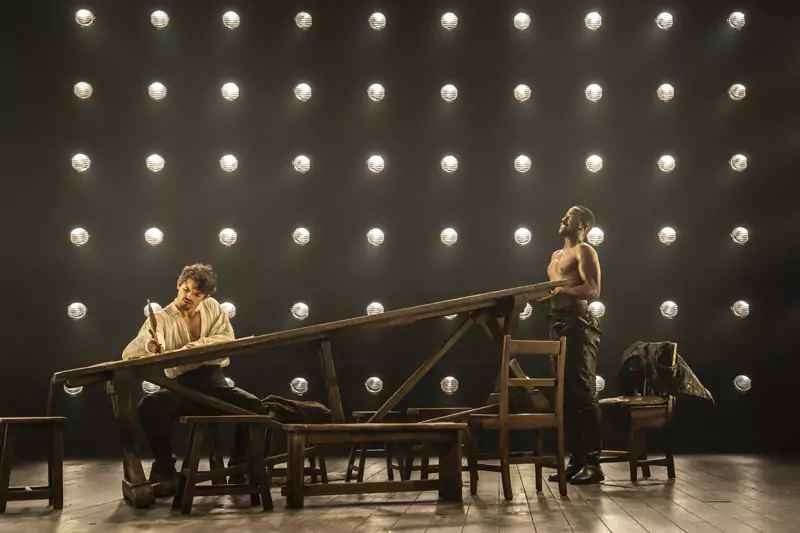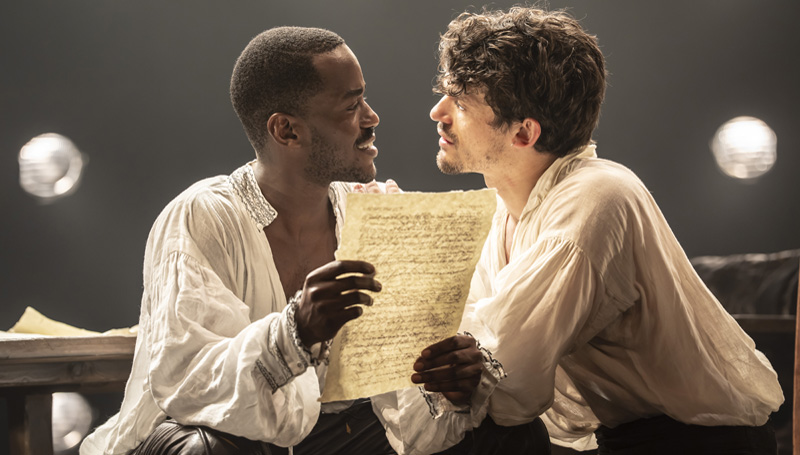“Born with Teeth” at Wyndham’s Theatre
Neil Dowden in the West End
6 September 2025
★★★★
Already staged several times in the States, it seems fitting that the European premiere of Liz Duffy Adams’s play Born with Teeth about the relationship between William Shakespeare and Christopher Marlowe should be given by the RSC. Unusually it has not been staged at Stratford before hitting the West End – perhaps due to the TV celebrity of its two youthful leads, Ncuti Gatwa as Marlowe (Kit) and Edward Bluemel as Shakespeare (Will), who bring plenty of pulling power to this entertainingly speculative drama in Daniel Evans’s lively production.

Ncuti Gatwa and Edward Bleumel.
Photo credit: Johan Persson.
Adams has pounced on recent scholarship examining use of language which suggests the two playwrights collaborated in the writing of all three parts of Henry VI (indeed the New Oxford Shakespeare credits Marlowe as one of Shakespeare’s co-authors). Her two-hander shows them working – and playing – together in the back room of a pub amid a paranoid political climate where Queen Elizabeth’s spy masters are looking for any sign of heresy or treason that could threaten the tenuous Protestant settlement. The play focuses on the shifting dynamic with an erotic frisson between two very different personalities who are rivals yet admire each other’s work. But who is playing who in this rapier-like battle of wits?
The show kicks off cleverly with a video sequence showing Kit and Will respectively hanging down and up from ropes screaming while being tortured by the security services, before Will calmly walks on stage and tells the audience: “Yeah, that never happened.” It’s a witty way of playing on our expectations of historical drama with Will acting as unreliable narrator looking back on events with modern hindsight as he addresses us directly before each of the three scenes running from 1591 to 1593, as well as in a Prospero-like epilogue. While Will conscientiously consults Holinshed’s Chronicles as the “authoritative” source on which to base their Henry VI trilogy – “It is a history play” – Kit responds with characteristic freedom of spirit, “All the more reason to use our imaginations.” This shout-out for literary licence gives the perfect pretext for Adams’s own ingenious conspiracy theories.
Though only two months older, Marlowe – benefiting from his Cambridge University education and contacts – forged his reputation slightly earlier than Shakespeare, though his fire burned fast and furious until suddenly extinguished when he was stabbed to death in a Deptford tavern aged only 29. As a government spy who overreached himself – like his own tragic protagonists such as Faustus and Tamburlaine – Marlowe may have been assassinated, as this play contends (though thankfully it doesn’t follow the Marlovian theory that he faked his death and went on to write Shakespeare’s plays!). In the play, Will isn’t sure if Kit is spying on him (to find out if he is a secret Catholic), warning him, or trying to recruit him – he tells Will how much better paid a spy is than a playwright. But Adams comes up with an audacious explanation for how Marlowe met his end.
It is the sexual as much as the political tension that propels this play (whose title is a quote from Henry VI, Part 3 describing the future Richard III). Without any solid evidence it has been claimed that Marlowe was gay and Shakespeare bisexual (of course he was married with three children), but Adams leaves no doubt over there being a strong and mutual physical attraction between them. Kit is exuberantly open in his sexuality, even predatory as the man with the power in their relationship, whom Will cannot afford to – or does not want to – resist. Their sparring is so passionate at times that it turns violent – though they quickly make up – as fighting blurs into flirting. The hard-working Will sometimes struggles to keep the oversexed Kit on the job in hand, as it were.

Edward Bleumel and Ncuti Gatwa. Set by Joanna Scotcher.
Photo credit: Johan Persson.
At the start, Will – who is still making his way in his career – is deferential, even slightly in awe of Kit – already a star poet and playwright – who has set the template of blank verse tragedy that he follows. But Adams shows how the balance between them changes over the two years covered as Will becomes more successful due to his focused application as all-round man of the theatre – actor, writer, and shareholder in his company – while the reckless Marlowe dices with danger. Of course we know that Shakespeare went on to far supersede Marlowe in posterity – and would no doubt have done so even if the latter hadn’t died so young. But Adams hints at the influence Kit has on Will as a sort of mentor not only in his writing but in the way he conducts himself – to Kit’s own cost as the poignant ending reveals.
This biographical Shakespeare play – part comedy, part thriller – brims with references to other Shakespeare plays. Without going very deep, it zips by in 90 minutes. It’s a different show from the RSC’s 2023 stage adaptation of Maggie O’Farrell’s novel about the bard’s domestic life, Hamnet – though both are equally conjectural.
Surprisingly, it is Evans’s first production as director since becoming RSC’s co-artistic director (with Tamara Harvey) just over two years ago – but having played the title role in Marlowe’s Edward II at Stratford earlier this year it is well-timed. The show’s concentrated energy is impressive. Like the writing itself, Joanna Scotcher’s costumes give period style a modern twist, while her simple but effective set design has a wooden table and chairs claustrophobically enclosed by three walls of lights as if in a state of surveillance. Neil Austin’s glaring lighting is accompanied by discordant sound from George Dennis, as well as Andrzej Goulding’s arresting video displays between scenes.
Gatwa – who made his name on the small screen first in Sex Education and then as the star of Doctor Who before appearing in the National Theatre’s revisionist The Importance of Being Earnest (which is just about to transfer to the West End) – embodies the more flamboyant role of Kit with a camp swagger. Wearing an all-black-leather outfit reminiscent of a biker, while at one point stripping off his top, he athletically jumps on and off the furniture, and strokes his “quivering quill” suggestively in a seductively charismatic performance that also conveys a self-destructive streak.
But Bluemel (who also appeared in Sex Education as well as Killing Eve) is a good counterpoint as the naïve but ambitious Will whom Kit “underestimates”, equally amusing in a more understated way. And his direct addresses to the audience are nicely judged, sympathetic to his ill-fated friend but with the quiet confidence of a survivor who knows his work will flourish.









